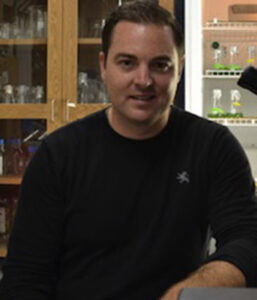BS/MPH: Environmental Health Sciences BS / MPH
The accelerated MPH Environmental Health Sciences program is designed to meet the academic and professional goals of high-achieving students who want to begin their career as public health professionals.
The five-year accelerated graduate program consists of 3.5 years in undergraduate status and 1.5 years in graduate status. You’ll develop relationships with our expert faculty in your freshman year that will grow through graduation and beyond.
The BS/MPH in Environmental Health Sciences prepares high achieving students to analyze biological, chemical, and built environments to improve the public’s health. Laboratories and equipment are available across campus to promote innovative learning in environmental health sciences.
Program Type
Accelerated Graduate
Program Format
On Campus
Student Spotlight
“What led me to public health was a passion for helping others. I started off as a pre-nursing major when I came into college, and I switched because, with public health, I can have a greater impact with more people.
For me, personally knowing that I have had an impact on someone’s health fills me with a sense of pride and personal satisfaction. The accelerated master’s program not only allows me to pursue my own personal goals, it also allows me to pursue my passion.”
Jarred Wuensch, BS/MPH — Environmental Health Sciences

Students’ experiences in Environmental Health Sciences incorporate environmental health theories with cross-cutting public health competencies such as communication, public health biology, systems-thinking, and leadership.
Through hands-on learning and mentored field placements, accelerated MPH students develop new specialized skills and ways to improve the health of communities. Public health at UWM is your home to learn, connect, and make a difference.
Accelerated BS/MPH in Environmental Health Sciences
The BS in public health requires a minimum of 120 credits. The MPH with a concentration in Environmental Health Sciences requires 45 credits. Up to 29 graduate course credits may be double-counted toward the BS in public health.
Undergraduate Courses
At least 33 credits of general education and foundations courses.
Public Health Major Required Courses (48 credits)
PH 101: Introduction to Public Health (3 credits)
PH 142: Exploring Global Environmental Health (3 credits)
PH 201: Public Health from Cells to Society I (3 credits)
PH 202: Public Health from Cells to Society II (3 credits)
KIN 270: Statistics in the Health Professions: Theory and Practice (3 credits)
Or SOCIOL 261: Introduction to Statistical Thinking in Sociology (3 credits)
PH 302: Health and Disease: Concepts and Contexts (3 credits)
PH 303: Climate Change, the Environment & Human Health (3 credits)
PH 304: Foundations of Epidemiology (3 credits)
PH 319: Introduction to Health Disparities (3 credits)
PH 327: Foundations for Action in Public Health (3 credits)
PH 346: Environmental Health and Disease (3 credits)
PH 355: Public Health Research Methods I (3 credits)
PH 410: True Lies — Consuming & Communicating Quantitative Information (3 credits)
PH 427: Strategies for Action in Public Health (3 credits)
PH 428: Project Implementation & Evaluation for a Healthy Society (3 credits)
PH 455: Public Health Research Methods II (3 credits)
Elective credits — up to 10 credit hours to reach 120 credits.
Graduate Courses
MPH Required Common Core Courses (24-25 credits)
PH 702: Introduction to Biostatistics (3 credits)
PH 703: Environmental Health Sciences (3 credits)
PH 704: Principles and Methods of Epidemiology (3 credits)
PH 705: Principles of Public Health Policy and Administration (3 credits)
PH 706: Perspectives on Community and Behavioral Health (3 credits)
PH 708: Health Systems and Population Health (3 credits)
PH 733: Overview of Qualitative Methods for PH (1 credit)
PH 790: Field Experience in Public Health (3 credits)
PH 791: Leadership in Public Health (1 credit)
PH 800: Capstone in Public Health (2 credits)
Required EHS Track Courses (8 credits)
PH 743: Environmental Risk Assessment (3 credits)
PH 750: Seminar in Environmental Health Sciences (2 credits)
PH 762: Environmental Epidemiology (3 credits)
Built Environment “S”elective — Choose one (3 credits)
ARCH 790: Special Topics (1-3 credits)
GEOG 520: The Physical Geography of the City (3 credits)
GEOG 880/URBPLAN 880: Urban Sustainability (3 credits)
GEOG 945: The Internal Structure of the City (3 credits)
IDN ENG 580 Ergonomics (3 credits)
URBPLAN 791 Introduction to Urban Geographic Information Systems for Planning (3 credits)
Other classes as approved by MPH faculty advisor.
Chemical Environment “S”elective – Choose one (3 credits)
PH 741: Environmental Public Health Microbiology (3 credits)
PH 745: Developmental Toxicology (3 credits)
Other classes as approved by MPH faculty advisor.
Biological Environment “S”elective – Choose one (3 credits)
PH 741: Environmental Public Health Microbiology (3 credits)
PH 745: Developmental Toxicology (3 credits)
Other classes as approved by MPH faculty advisor.
Elective — Choose one additional course (3 credits)
Choose from built, chemical, or biological “S”electives listed above or other classes as approved by MPH faculty advisor.
MPH Environmental Health Sciences Track Competencies
- Describe genetic, physiological and overall human health effects of primary environmental hazards resulting from both chronic and acute exposures.
- Describe approaches for assessing, preventing and controlling environmental hazards that pose risks to both human and ecological health.
- Perform a risk assessment of an environmental health agent.
- Identify, locate and use appropriate reference materials.
- Comprehend the primary scientific research literature and obtain information directly from experts in the field of environmental health sciences.
Please note: All courses are subject to change. Please consult the Academic Catalog for the most up-to-date information.
Accelerated MPH Environmental Health Sciences Careers
Graduates from the MPH program with a concentration in Environmental Health Sciences often work for health institutions at the city, state or national level. Other opportunities exist in public health roles that look at the intersection of the built environment and human health, like the Department of Housing and Urban Development. Job growth for environmental specialists is higher than average, according to the U.S. Bureau of Labor Statistics.
- Associate Professor, Environmental Health Sciences
- kalkbren@uwm.edu
- KIRC 5073
- Associate Professor, Environmental Health Sciences
- millertr@uwm.edu
- 414-229-5097
- KIRC 5053
- Associate Professor, Environmental Health Sciences
- svobodak@uwm.edu
- 414-229-7440
- KIRC 5049
Environmental Health Sciences Faculty Expertise
- Prenatal exposure to dioxin and related contaminants and the impact on children’s immune system health.
- Environmental and human health effects of anthropogenic chemicals, such as engineered nanomaterials.
- Factors that regulate human exposure to naturally occurring or anthropogenic toxins in water or wastewater.
- Nicotine toxicity and the developmental biology of nicotinic acetylcholine receptors.




